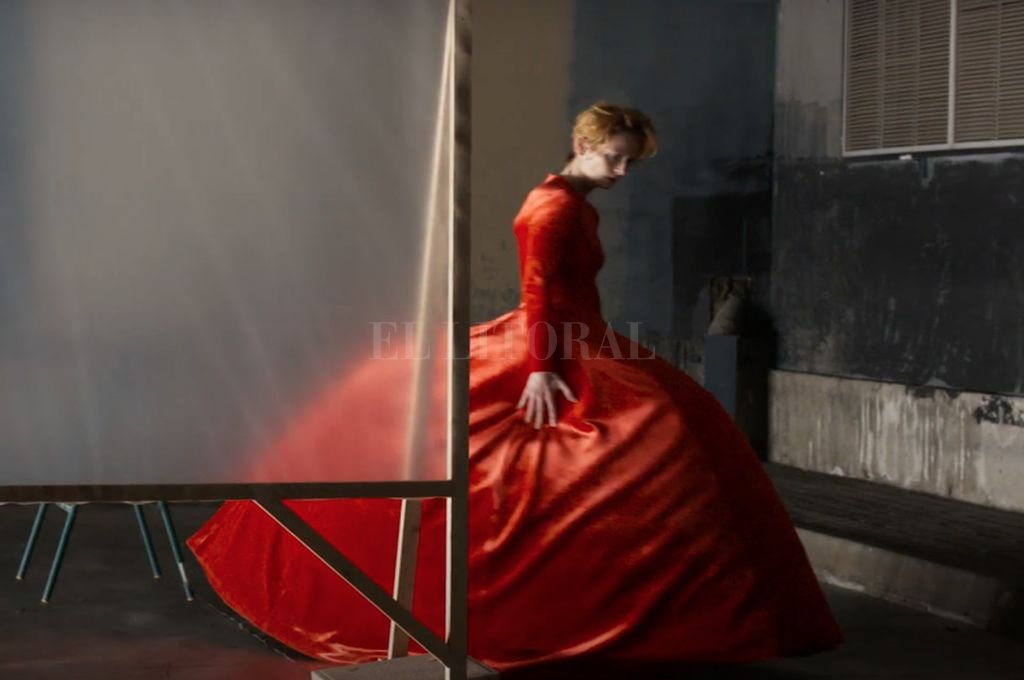by Nathaniel R

Green. Black. And of course, glorious Red. These are just some of the bold colors worn by Tilda, hanging not just from her body in a true fashion parade, but spilling from her tight mouth. Pedro Almodóvar's first English language project, The Human Voice (2020), a swift 30 minute monodrama "freely" based on Jean Cocteau's play, makes perfectly expected use of Tilda's much-celebrated fashion iconicity. More crucially it doesn't forget her acting gift. The actress repays the auteur with primal colors of jealously, nihilism, and fury in her line readings...
Filmed during the COVID-19 pandemic, The Human Voice is entirely Tilda all the time but for a canine companion (unusual for a Pedro movie), aside from a very brief opening scene set within the world's most Art-Directed hardware store where she purchases a single axe, that is promptly folded up in brown paper like a triangular bouget of roses and unceremoniously shoved into her handbag. In the lushly visual short film, she wanders between "rooms" in ever-changing costumes within an elaborate set that is both finished (fully set-dressed) but also abstracted, existing without ceilings and in an otherwise empty warehouse.

Like so many of Almodóvar's previous projects, The Human Voice, is slippery, fluid in mood and imagery and easy to lose in the meta-stream of the auteur's now-large filmography. In ways that are usually celebrated but are probably more than a little alienating for the casual viewer, Almodóvar's projects are constantly in dialogue with each other to the point where you can be forgiven for temporarily forgetting which one you're watching. Roughly a third of his movies could well interchange their titles without losing their identity. Consider that most of his unforgettable gallery of great characters might be accurately described as women are on the verge of a nervous breakdown and the law of desire is always in play. And that's just a broad overview effect. In other words, he "volvers" all over the place within his own career!
More specifically, in The Human Voice's brief running time he redeploys Talk to Her's score, vividly twins the manic waiting-by-the-phone energy of Carmen Maura in Law of Desire, and blurs the line between whether you're watching a film or the making of that same film which is one of his most frequent tropes. And it's not just past movies that he draws your eye too. The Human Voice even contains an easter egg for his next full feature, A Manual for Cleaning Women. His next film is based on that book which we see in one memorable shot, that cinephiles and bibliophiles alike will drool for, as Tilda restacks a group of DVDs and books. She's been obsessively watching and reading them while waiting for her absent lover to return.
 He doesn't return -- this is a mono-drama, after all -- and she becomes increasingly unhinged. But it's not all a Pedro retread. Tilda brings entirely different, more cerebral energy to the material than Pedro's usual muses. She shares Penelope Cruz's utter command of the camera but none of her soft melodrama. She shares with Carmen Maura a kind of deadpan opacity but with less comedy and more abstraction. The Human Voice, then becomes a riveting unlikely faceoff/collaboration between two of cinema's greatest arists. One of the slyest notes, is the ending, which should be entirely distressing but instead feels comical, even oddly amiable, in its rage, as Tilda matter-of-factly exits the set, absolutely done with it, allowing us to escape with her, and just in time. A-
He doesn't return -- this is a mono-drama, after all -- and she becomes increasingly unhinged. But it's not all a Pedro retread. Tilda brings entirely different, more cerebral energy to the material than Pedro's usual muses. She shares Penelope Cruz's utter command of the camera but none of her soft melodrama. She shares with Carmen Maura a kind of deadpan opacity but with less comedy and more abstraction. The Human Voice, then becomes a riveting unlikely faceoff/collaboration between two of cinema's greatest arists. One of the slyest notes, is the ending, which should be entirely distressing but instead feels comical, even oddly amiable, in its rage, as Tilda matter-of-factly exits the set, absolutely done with it, allowing us to escape with her, and just in time. A-
The Human Voice is available to rent for "virtual" screening until September 29th